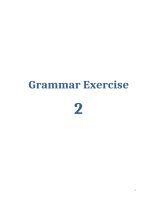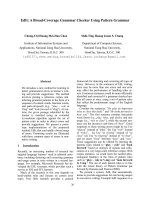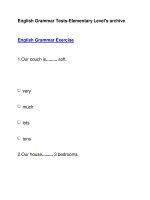Exercise grammar check
Bạn đang xem bản rút gọn của tài liệu. Xem và tải ngay bản đầy đủ của tài liệu tại đây (9.56 KB, 3 trang )
Exercise: Grammar check
This grammar exercise tests your understanding of English grammar rules.
1. Words used to modify nouns are called …………………
a) adjectives
b) adverbs
c) conjunctions
2. Adverbs can modify verbs, adjectives and other adverbs.
a) True
b) False
3. The present perfect tense can be used with past time adverbs like yesterday and last week.
a) True
b) False
4. In the simple present tense, we use did to make questions and negatives.
a) True
b) False
5. The present continuous tense can be used to talk about future events.
a) True
b) False
6. Modal auxiliaries do not have infinitives or –ing forms.
a) True
b) False
7. We cannot use the article a/an with uncountable nouns.
a) True
b) False
8. When enough modifies a noun, it goes after it.
a) True
b) False
9. We need two conjunctions to join two clauses.
a) True
b) False
10. Prepositions can go at the end of a sentence.
a) True
b) False
11. Proper nouns always begin with a capital letter.
a) True
b) False
12. Which of the following can be used to join two clauses?
a) Conjunctions
b) Relative pronouns
c) Relative adverbs
d) All of these
Answers
1. a) adjectives
2. a) True
3. b) false
4. b) False (In the simple present tense, we use do and does to make questions and negatives)
5. a) True
6. a) True (Will is an exception to this rule. It does have an –ing form – willing; however, the auxiliary will and the
participle willing have very different meanings.)
7. a) True
8. b) False (When enough modifies a noun, it goes before it. Example, enough chairs, not chairs enough)
9. b) False
10. a) True
11. a) True
12. d) All of these
Be first to know when grammar rules change! Sign up to our newsletter here: englishgrammar.org (It's free)
Powered by TCPDF (www.tcpdf.org)









